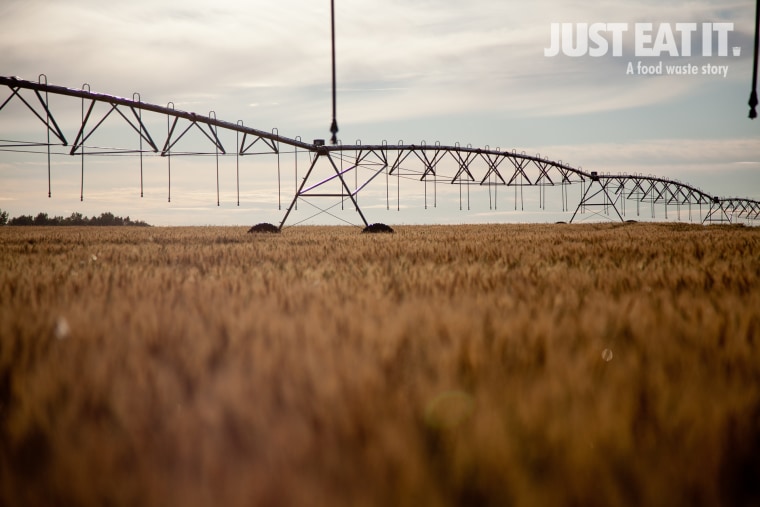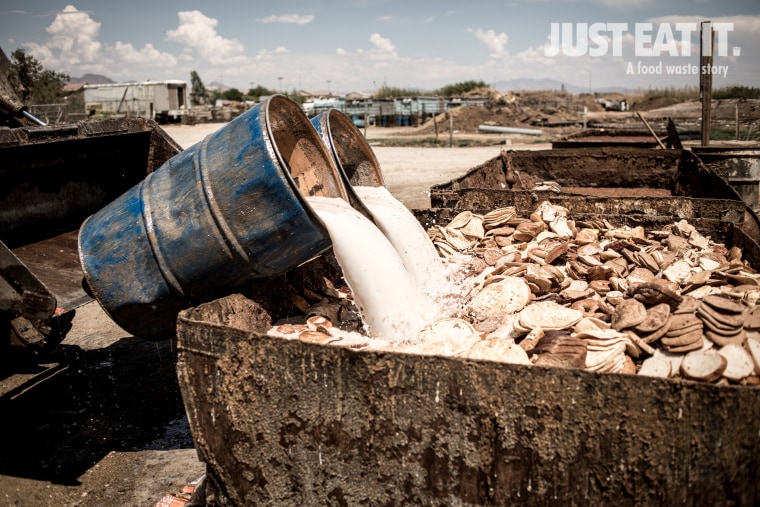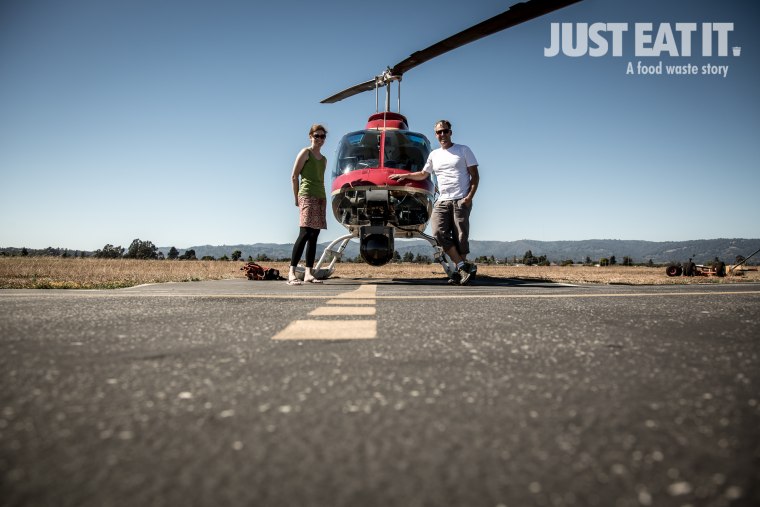Jen Rustemeyer is the producer of msnbc's newest documentary, "Just Eat It". Before making this film on food waste, Jen and her husband Grant Baldwin produced "The Clean Bin Project," documenting their attempt to live one year creating zero waste. Learn more about "Just Eat It" here.
msnbc: What inspired Just Eat It and your project to live six months solely on rescued food?
Jen: Our previous film was on living "zero waste" so we became really interested in the type of things people throw away and why we throw out things. And that’s when we started to realize that actual edible food was ending up in the garbage. So then, when we heard the statistic that 40% of food is being wasted, we hardly believed it. We knew there was some food ending up in the garbage, but we kind of wanted to see it with our own eyes. Then Grant came up with this idea that if we want to prove that the food is truly edible and shouldn't end up in the garbage, we should really be eating it and so we would survive off it for 6 months. And that’s kind of how the project started.

Jen: I don’t know. A couple of reports came out. The first time I saw food in the garbage and I realized it was an issue was at a school. We were talking about recycling and we were doing a waste audit. We were looking at [the school's] garbage and putting it into piles of plastic and paper and the things they should have recycled. And they had all this edible food in there like pudding cups, bananas and sandwiches and things we didn't really realize that were ending up in the garbage and we didn't have a category for that. We started doing research after that. Then we read Jonathan Bloom's book, [American Wasteland], who is also in the film. And he is a wealth of information.
msnbc: In both films, you and Grant are not only the filmmakers but you also turn the camera on yourself as participants. Is that duality difficult?
Jen: Yeah I mean, in some ways it’s easy because you have unlimited access and you don’t have to worry about asking for permission for anything. But on the other hand, it’s definitely stressful on a relationship to decide when we are going to be filming or be living your life with a camera in your face. And more so when it comes time for editing because we edited it together, so choosing which scenes are going to be in or out even if you know you don’t look your best, that’s definitely a challenge.
msnbc: What was your greatest hurdle over the six months of this project?
Jen: For me, having such strict rules. I know a lot of people who have done dumpster diving or supplemented their diet but because we were doing exclusively rescued food, we really had to be creative with recipes and make lots of substitutions and be flexible with what we were finding. It’s really hard in the summer, when I saw all the fresh local produce at the farmer’s market and I couldn't buy it all because we were supposed to be only eating rescued food. So yeah, that was a challenge for me.

Jen: Food is so important in our culture and wasting it is not on people’s minds. I see it everywhere, especially plate waste. You go to a restaurant, you see plate waste everywhere. And I don’t think those people are doing it maliciously or even thoughtfully. I think it’s just not even on their radar yet. It’s the new food issue that really needs to be discussed.
msnbc: If you could get everyone to change one thing about how they approach food, what would it be?
Jen: The easiest thing for an individual to do is only take as much food as you’re going to eat on your dinner plate and make sure you finish it. It’s so simple, you’ll save money. You don’t have to give up anything or change your diet or anything like that. Just eat everything that you take.

Jen: We are pretty proud of our production quality because we’re a really independent production company. There’s really only two of us and we shot it and filmed it and edited it and scored it. I actually give Grant most of the credit for that. But we think it really looks like a whole team was behind it and so we’re really proud of that.
msnbc: What stayed with you after the six month project was done?
Jen: I think the way I value food. Once you do a project like this you can’t turn it off so I really notice food waste everywhere. I’m super conscious of it in my own house. That’s not to say I never waste food, but it’s definitely on my radar and I try to make one meal go into the next so that I’m always eating a little bit of leftovers incorporated into the next meal. It just changed my mindset about the way we eat.
We had a baby last year, so often people say, oh you couldn't do no food waste when you have kids because they’re so wasteful. We are just getting to that stage right now with him. And so we are really careful that we just give him really small portions to see if he likes things to begin with before we give him a whole bowl full of cereal that he’s going to throw out. So we’re conscious of it with families too and it’s possible.
msnbc: Now that your experiment is done, how are you tackling the issues?
Jen: We are getting more involved in our greater community. We’re working with a team here in Vancouver to have a seating 5,000 event, where we are going to feed 5,000 people free lunch, basically to draw attention to the issue of food waste. So being more public about it and then talking to grocery stores and wholesalers and trying to get them to change. We’re getting a little more political about it.
msnbc: Are the grocery stores receptive to your talks?
Jen: I think the timing is right. Some grocery stores aren't ready to talk and some are just starting to sell ugly produce and things like that and I think that’s a really good step.
Just Eat It premieres on msnbc on Earth Day, April 22nd at 10 PM ET.
